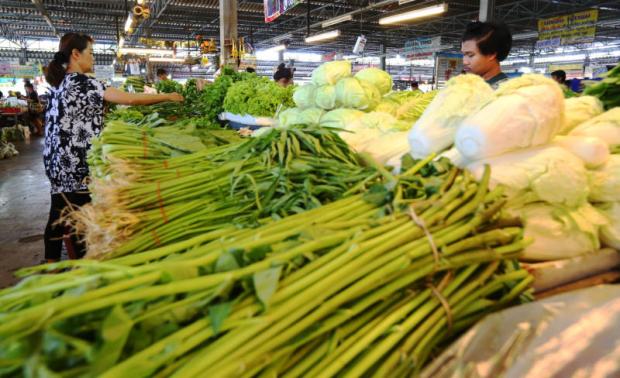
Headline inflation in April surged to the highest level in 14 months, driven by rising prices for fresh vegetables, tobacco, alcoholic drinks, fuel, housing and furnishings.
The Commerce Ministry Tuesday said the consumer price index (CPI) last month rose 1.07% year-on-year after a 0.79% increase in March. This followed an increase of 0.42% in February, which eased from a 0.68% reading in January.
The rises happened both in the food and non-food sectors, with food and non-alcoholic drinks prices up 0.68% year-on-year, led by fruits and vegetables, rice, non-alcoholic drinks and prepared meals.
Non-food and alcoholic drinks prices surged 1.31% year-on-year, largely for cigarettes, beer, wine, liquor, housing rent, power bills, cooking gas and fuel.
Of the 422 products and service items used to gauge inflation, 239 items rose in price last month. No price changes were registered for 71 items, while 112 saw prices drop.
On a monthly basis, the ministry reported that prices increased 0.45% from March, when the rate contracted 0.09% from February.
Rice prices, in particular, rose 1.84% from March on higher foreign purchase demand.
For the first four months, headline inflation was 0.75% year-on-year.
Core CPI, which excludes raw food and energy prices, rose 0.64% year-on-year in April and 0.03% month-on-month. For the past four months, core inflation averaged 0.62%.
Pimchanok Vonkorpon, director-general of the Trade Policy and Strategy Office, said demand in the household sector is starting to improve on higher production and farm prices, state subsidy programmes for low-income earners through the smart card scheme, and the hike in daily minimum wages.
The rises were also boosted by accelerated state spending, growing exports and robust tourism.
But Ms Pimchanok said the uncertain policies of Thailand's key trade partners, the baht's appreciation, volatile oil prices and a possible delay in government investment projects remain key areas of concern.
"Inflation in the second quarter is expected to stay higher than 1% and average 1% for the whole year, largely on higher oil prices," she said.
The Commerce Ministry is keeping its inflation forecast of 0.7-1.7% for the year, though the economy is improving and the recent wage hikes are expected to lift consumer prices.
The projection is based on a GDP growth rate of 3.6-4.6% this year, with Dubai oil prices in a range of US$55-65 a barrel and an exchange rate of 32-34 baht to the US dollar.
The cabinet in late January endorsed daily minimum wage hikes of 5-22 baht from early April. The highest increases occurred in Chon Buri, Phuket and Rayong.
The most affected industries include food/drinks, tanning, office supplies and basic metal products. In the service sector, construction, wholesale/retail, car/motorcycle repairs, hotels and food services are expected to feel the pinch.